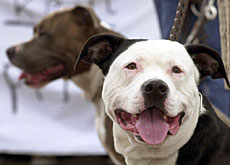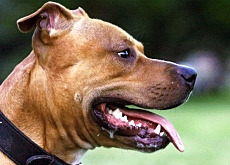Cantons unleash new laws on dangerous dogs

Government moves to tighten legislation on so-called dangerous dogs have failed to stop several cantons from striking out on their own.
Since the tragic killing of a six-year-old boy by three Pitbull terriers a fortnight ago one regional authority has banned 12 breeds and several others are drawing up tougher ownership restrictions.
Within days of the youngster’s death, the Federal Veterinary Office appointed a group of experts to come up with a set of nationwide recommendations by the end of January.
Among the measures they are considering are bans on certain breeds and compulsory training for owners of dogs over a certain size.
But rather than wait for the government to act, a number of cantons – which are responsible in Switzerland for setting laws on dog ownership – are in the process of rushing out new legislation.
The Swiss Canine Association has criticised the hysteria and haste with which some regional authorities have reacted, saying a more measured response is needed.
“We are not talking about dogs anymore – this is just about politics,” Peter Rub, president of the association, told swissinfo.
“Every canton is doing something because they are afraid of a similar tragedy happening. We think everyone should wait for the group of experts.”
Breeds banned
The first to set the ball rolling was canton Valais, which announced on Friday that it would ban 12 breeds including Pitbull terriers, Dobermanns, Rottweilers and Mastiffs. The new restrictions come into force on January 1.
Thomas Burgener, head of the canton’s department of health and social affairs, denied this was a knee-jerk reaction and rejected the criticism from the Swiss Canine Association.
He said the 12 breeds on the list were already required to be kept muzzled and on a leash under legislation introduced two years ago, which allowed for an eventual ban.
“It is true that the incident in Oberglatt pushed us to take this action. But if we can prevent a similar accident happening in the future then none of this criticism will matter,” he said.
Burgener added that he had also decided to act immediately rather than wait for the group of experts because he had little confidence in the process.
“I don’t think they will come up with very much,” he said. “We must take action and at the same time continue to pressure the federal authorities.”
Tight restrictions
Other cantons have been quick to follow suit. On Monday Zurich’s parliament – the canton in which the child was killed – voted in favour of an initiative that would impose tight ownership restrictions on dangerous dogs.
Canton Basel City, which is seen as a pioneer on legislation against dangerous dogs, also wants to introduce more stringent measures.
Its government presented a draft law on Tuesday that would give it the right to outlaw certain breeds and restrict owners to one dangerous dog. Muzzles and leashes, as in Zurich, would be mandatory.
The issue is also on the agenda in canton Vaud where parliamentarians are discussing whether to impose a supplementary tax of SFr500 ($386) on owners of potentially dangerous breeds.
But not everyone is jumping on the bandwagon. Canton Bern said on Monday that it would wait for the government to come up with nationwide recommendations and then adapt its legislation accordingly.
However, the canton added that it was up to local communities to take whatever measures they saw fit to protect the public in the meantime.
Possible restrictions could include ordering dogs viewed as potentially dangerous to be kept on a leash, muzzled or placed in secure compounds.
Measured response
The Federal Veterinary Office, which has made it clear that it is owners rather than particular breeds that are the problem, declined to comment on individual action taken by some cantons.
“If some cantons have decided it is important to do something now that’s their responsibility,” Franz Geiser, head of communications at the Veterinary Office, told swissinfo.
“After the federal authorities have issued their recommendations these will be handled alike in all cantons. But they will still be free to take more stringent measures as they decide. What the federal authorities recommend will be the minimum.”
Geiser said the recommendations due to be issued before the end of January were likely to form part of the animal protection law, which is currently under revision, or be set down in a new ordinance.
On Tuesday a Senate committee recommended that the government move as quickly as possible on the issue, suggesting an ordinance would be the best option. Unlike new legislation, an ordinance cannot be challenged in a nationwide vote.
Geiser added that the government had opted not to do something “spectacular” such as imposing an immediate ban on certain breeds because it was in favour of a more measured response.
“We want measures that are really helpful and not excessive. If we banned one or two breeds that would be spectacular and many people would be satisfied but it would not solve the problem because other dogs can also be dangerous.
“A ban on breeds alone without other measures does not solve the problem,” he said.
swissinfo, Adam Beaumont with agencies
Canton Zurich already compels owners to keep dogs prone to biting on leashes and muzzled at all times. Cantons Basel City, Basel Country, Geneva and Ticino have tighter laws, including microchips for dangerous breeds.
Swiss law already forbids breeding to produce fighting dogs. And by the end of next year all dogs, regardless of their breed, must be tagged with microchips or tattoos and placed on a national register.

In compliance with the JTI standards
More: SWI swissinfo.ch certified by the Journalism Trust Initiative










You can find an overview of ongoing debates with our journalists here . Please join us!
If you want to start a conversation about a topic raised in this article or want to report factual errors, email us at english@swissinfo.ch.